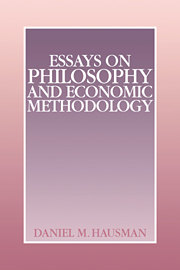Book contents
- Frontmatter
- Contents
- Introduction: What is philosophy of economics?
- PART I METHODOLOGY AND THEORY APPRAISAL
- 1 Economic methodology in a nutshell
- 2 On the conceptual structure of neoclassical economics – a philosopher's view
- 3 John Stuart Mill's philosophy of economics
- 4 The deductive method
- 5 Why look under the hood?
- 6 An appraisal of Popperian methodology
- 7 Is falsificationism unpractised or unpractisable?
- 8 The limits of economic science
- PART II CAUSALITY IN ECONOMICS
- PART III CASES AND PUZZLES
- PART IV POSTSCRIPTS
- Bibliography of relevant writings by Daniel M. Hausman
- Bibliography of works by other authors
- Index
3 - John Stuart Mill's philosophy of economics
Published online by Cambridge University Press: 05 June 2012
- Frontmatter
- Contents
- Introduction: What is philosophy of economics?
- PART I METHODOLOGY AND THEORY APPRAISAL
- 1 Economic methodology in a nutshell
- 2 On the conceptual structure of neoclassical economics – a philosopher's view
- 3 John Stuart Mill's philosophy of economics
- 4 The deductive method
- 5 Why look under the hood?
- 6 An appraisal of Popperian methodology
- 7 Is falsificationism unpractised or unpractisable?
- 8 The limits of economic science
- PART II CAUSALITY IN ECONOMICS
- PART III CASES AND PUZZLES
- PART IV POSTSCRIPTS
- Bibliography of relevant writings by Daniel M. Hausman
- Bibliography of works by other authors
- Index
Summary
John Stuart Mill regards economics as an inexact and separate science which employs a deductive method. This paper analyzes and restates Mill's views and considers whether they help one to understand philosophical peculiarities of contemporary microeconomic theory. The author concludes that it is philosophically enlightening to interpret microeconomics as an inexact and separate science, but that Mill's notion of a deductive method has only a little to contribute.
John Stuart Mill's reflections on the nature of economic theory and on the manner in which it is to be justified have not received the attention they deserve. Although Mill's views are problematic, they have much to contribute to current thinking about the methodology of economics. Mill offers philosophical interpretations of the nature and justification of economic theory in three main places: in Book VI of A System of Logic, in his earlier essay, “On the Definition of Political Economy and the Method of Investigation Proper to It,” and, less explicitly, in scattered passages of his Principles of Political Economy and of his other essays on economics. The relationship of the actual economic theorizing Mill did in the Principles to his philosophical construal of the nature of economic theory is complicated and will not be discussed in this essay (see Keynes 1917, pp. 19–20). Mill's views on the nature of economics differ somewhat among and within these sources. These differences will be discussed briefly where relevant.
- Type
- Chapter
- Information
- Essays on Philosophy and Economic Methodology , pp. 33 - 53Publisher: Cambridge University PressPrint publication year: 1992



